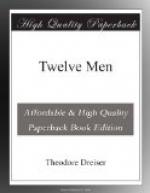“This is why, in my humble judgment, the Church and those associated with its aims make no more progress than they do. While they are consciously eager to better the world, they are so wrapped up in themselves and their theories, so hampered by their arbitrary and limited conceptions of good and evil, that the great majority of men move about them unseen, except in a far-away and superficial manner. Men are not influenced at arm’s length. It would be interesting to know if some day a preacher or judge, who, offended by Mr. Culhane’s profanity and brutality, will be able to reach the gladiator and convert him to his views as readily as the gladiator is able to rid him of his ailment.”
In justice to the preachers, moralists, et cetera, I should now like to add that it is probably not any of the virtues or perfections represented by a man like Culhane with which they are quarreling, but the vices of many who are in no wise like him and do not stand for the things he stands for. At the same time, the so-called “sports” might well reply that it is not with any of the really admirable qualities of the “unco guid” that they quarrel, but their too narrow interpretations of virtue and duty and their groundless generalization as to types and classes.
Be it so.
Here is meat for a thousand controversies.
A True Patriarch
In the streets of a certain moderate-sized county seat in Missouri not many years ago might have been seen a true patriarch. Tall, white-haired, stout in body and mind, he roamed among his neighbors, dispensing sympathy and a curiously genial human interest through the leisure of his day. One might have taken him to be Walt Whitman, of whom he was the living counterpart; or, in the clear eye, high forehead and thick, appealing white hair, have seen a marked similarity to Bryant as he appeared in his later years. Already at this time he had seen man’s allotted term on earth, and yet he was still strong in the councils of his people and rich in the accumulated interests of a lifetime.
At the particular time in question he was most interesting for the eccentricities which years of stalwart independence had developed, but these were lovable peculiarities and only severed from remarkable actions by the compelling power of time and his increasing infirmities. The loud, though pleasant, voice, and strong, often fiery, declamatory manner, were remnants of the days when his fellow-citizens were wholly swayed by the magnificence of his orations. Charmingly simple in manner, he still represented with it that old courtesy which made every stranger his guest. When moved by righteous indignation, there cropped out the daring and domineering insistence of one who had always followed what he considered to be the right, and who knew its power.




